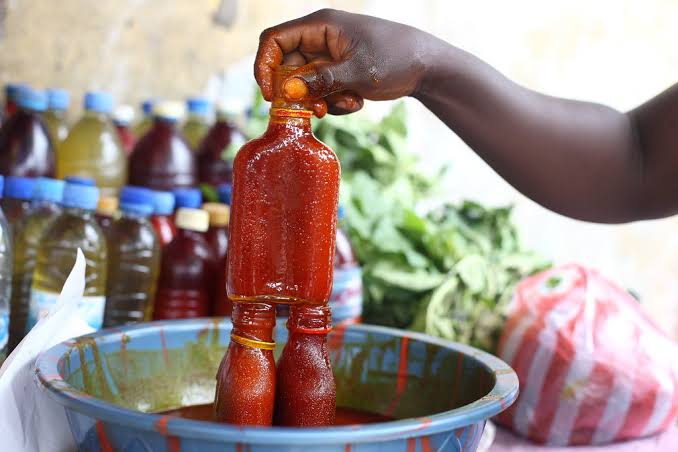The prices of goods and components are steadily rising in Nigeria.
Indeed, the whole thing was triggered by President Bola Tinubu’s petrol subsidy removal.
Now, food items which Nigerians were able to afford without many calculations, have now become a dream for many families.

Shockingly, many of these food items are produced here in Nigeria, yet, Nigerians now toil and sweat, before they could afford them.
If Nigerians were ever told that buying palm oil will be this expensive, the bearer of such news, even if he were to be a prophet, would have received the mockery of his life.
But indeed, the price of palm oil, a staple commodity in both culinary and industrial sectors, is witnessing a notable upswing.
As of March 18, 2024, the cost of this essential commodity that lubricates soups and other cuisines is experiencing a rise.
Prices now range from 600 to 700 Naira per litre, reflecting the dynamic market conditions and its pivotal role in the Nigerian economy.
Distribution And Pricing Dynamics
Palm oil is commonly sold in quantities of 5, 10, and 25 litres, but it is also available per kilogram and ton, catering to various consumer and industrial needs.
The pricing per litre for palm oil in Nigeria as of March 18, 2024, is detailed as follows:
– 4 litres (approximately 1 gallon) – ₦4,200
– 5 litres – ₦6,000
– 10 litres – ₦12,000
– 25 litres – ₦24,000
– 50 litres – ₦48,000
Furthermore, the average price of a gallon (about 4 litres) stands at ₦2,400.
The cost per kilogram ranges from 1,000 to 1,500 Naira.
Basically, this is influenced by the fluctuating economy and market supply-demand dynamics.
Regional Production Variations
The southeastern and south-south regions of Nigeria, particularly states like Imo, Abia, Anambra, Enugu, Ebonyi, Akwa Ibom, Cross River, Delta, and Edo, are renowned as the highest producers of palm oil.
The geographical concentration of production in these areas significantly affects the regional pricing and availability of palm oil.
This makes it more accessible and potentially cheaper in these producer states compared to other parts of Nigeria.
Palm Oil’s Multifaceted Use
Palm oil’s importance transcends the culinary realm, as it is integrated into various industrial products, including soaps, cosmetics, and pharmaceuticals.
Its nutritional value, rich in carotenoids and vitamin E, underscores its significance in addressing malnutrition and promoting general health.
Market Influences And Economic Implications
The price variance of palm oil in Nigeria is attributed to several factors.
Also Read: CBN moves to boost cassava, palm oil, others production in Nigeria
These factors include seasonality, production output in key regions, transportation costs, and international market trends.
Economic instability and foreign exchange fluctuations also play a critical role in shaping the domestic prices of palm oil.






